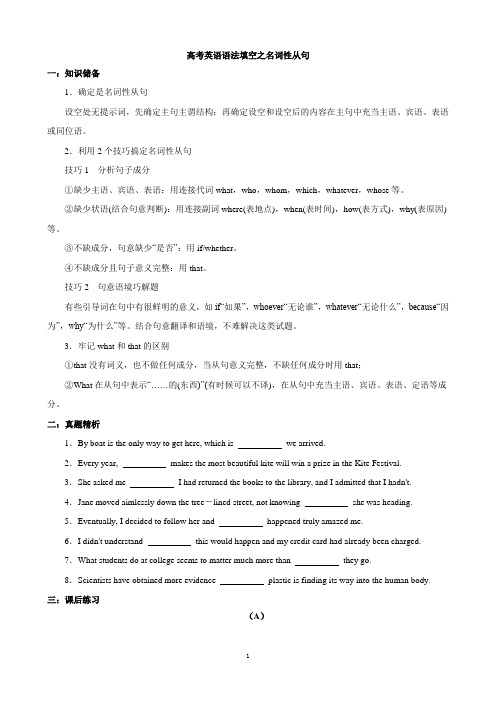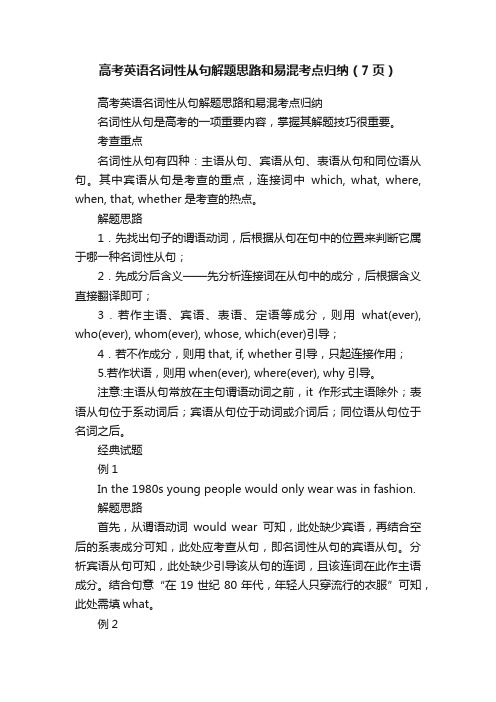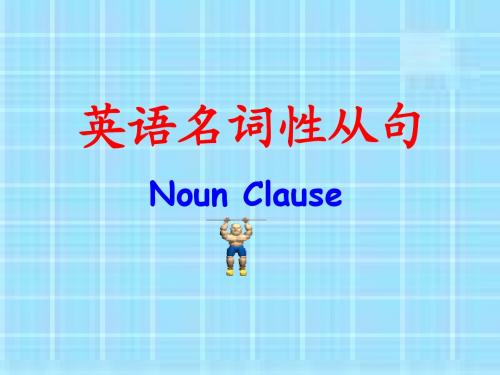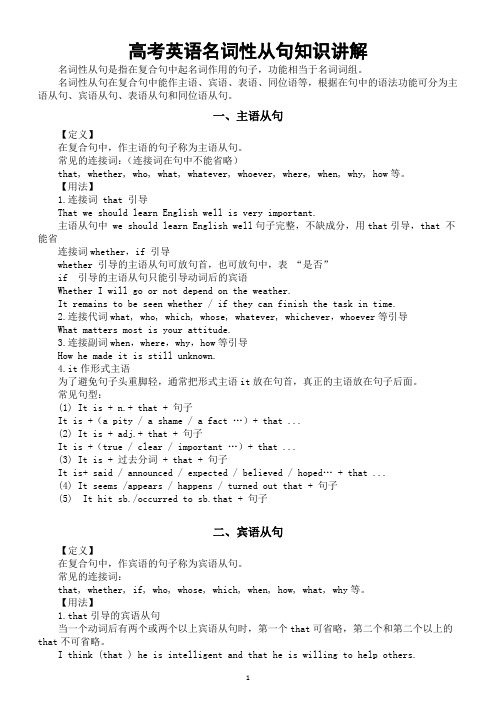【语法】高考英语名词性从句十大考点全攻略
高考英语语法填空之名词性从句

高考英语语法填空之名词性从句一:知识储备1.确定是名词性从句设空处无提示词,先确定主句主谓结构;再确定设空和设空后的内容在主句中充当主语、宾语、表语或同位语。
2.利用2个技巧搞定名词性从句技巧1分析句子成分①缺少主语、宾语、表语:用连接代词what,who,whom,which,whatever,whose等。
②缺少状语(结合句意判断):用连接副词where(表地点),when(表时间),how(表方式),why(表原因)等。
③不缺成分,句意缺少“是否”:用if/whether。
④不缺成分且句子意义完整:用that。
技巧2句意语境巧解题有些引导词在句中有很鲜明的意义,如if“如果”,whoever“无论谁”,whatever“无论什么”,because“因为”,why“为什么”等。
结合句意翻译和语境,不难解决这类试题。
3.牢记what和that的区别①that没有词义,也不做任何成分,当从句意义完整,不缺任何成分时用that;②What在从句中表示“……的(东西)”(有时候可以不译),在从句中充当主语、宾语、表语、定语等成分。
二:真题精析1.By boat is the only way to get here, which is we arrived.2.Every year, makes the most beautiful kite will win a prize in the Kite Festival.3.She asked me I had returned the books to the library, and I admitted that I hadn't.4.Jane moved aimlessly down the tree-lined street, not knowing she was heading.5.Eventually, I decided to follow her and happened truly amazed me.6.I didn't understand this would happen and my credit card had already been charged.7.What students do at college seems to matter much more than they go.8.Scientists have obtained more evidence plastic is finding its way into the human body. 三:课后练习(A)In 1863 the first underground passenger railway in the world opened in London.It ran for just under seven kilometers and allowed people to avoid terrible 1(crowd) on the roads above as they travelled to and 2 work.It took three years to complete and was built using an interesting method.This included digging up the road, 3(lay) the track and then building a strong roof over 4top.When all those had been done,the road surface was replaced.Steam engines 5(use) to pull the carriages and it must have been 6(fair)unpleasant for the passengers,with all the smoke and noise.However,the railway quickly proved to be a great success and within six months,more than 25,000 people were using 7every day.Later,engineers 8(manage) to construct railways in a system of deep tunnels (隧道),which became known as the Tube.This development was only possible with the 9(introduce) of electric-powered engines and lifts.The Central London Railway was one of the most 10(success) of these new lines,and was opened in 1900.It had white-painted tunnels and bright red carriages,and proved extremely popular with the public.(B)My mom was a nurse and often took me along to visit the 1(family) she was caring for,including one who had a series of strokes(中风) and was bedridden.One afternoon Mom told me that we needed to visit the woman 2(give) her medications,and that we would stop at a store 3the way.I thought we would stop at a drugstore,but we pulled up to a shopping mall.My mom 4(head) to the perfume counter and bought the most expensive bottle they offered.She also bought a beautiful nightdress.When I asked her who they were for,she said they were for her patient.She 5 (far) explained although this woman was quite old and bedridden,she was still a lady,and 6old deserved to be treated with respect and grace.When 7(care) for someone,we should look past the disability or the illness and look into the soul of the human,so we can connect them with sympathy.I soon realized that my mom’s greatest 8(strong) was taking care of those who cannot advocate for 9(they) and need trustworthy care providers.Actually,that’s the very reason 10I wanted to become a doctor myself.(C)China is the birthplace of kites.Most people believe they 1(invent) during the Spring and Autumn Period by the famous philosopher Mozi.It is said that he used wood to create a “ 2(fly) bird” that flew in the sky for a whole day.Kites were 3(late) used as military instruments to measure distance,test the wind, aid communication, and rescue people. During the Tang Dynasty, they were used more as a tool for 4(entertain) than a military instrument.At first,only royal family members could play with kites. Later it became popular among commoners who flew them on 5(importance) events and festivals.In the Ming Dynasty, kites were once again used 6military purposes. Many emperors ordered their soldiers to fly kites 7carried explosives.The explosives would fall on the enemy and gave the Chinese a great edge on the battlefield.Nowadays,flying kites has become 8popular form of entertainment and competition.More and more people at home and abroad are fond of flying kites in local or international events 9(show) their kite-making and kite-flying skills.The largest kite museum of the world is in the city of Weifang,10(know) as “Kite Capital of the World”,and every year,kite fans all over the world come to watch and take part in the annual International Kite Festival.。
高中英语知识点归纳名词性从句的特殊用法与考点

高中英语知识点归纳名词性从句的特殊用法与考点高中英语知识点归纳:名词性从句的特殊用法与考点介绍:名词性从句是英语中的一个重要语法要点,它作为一个句子的成分在句中起到名词的作用。
名词性从句的特殊用法及考点在高中的英语学习中经常出现,掌握这些知识点对于提高学生的语言表达能力和理解能力至关重要。
一、名词性从句的特殊用法:1. 作主语:名词性从句可以作为主语出现在句子中,常常使用的引导词是“that”或者是连接代词“wh-”引导的从句。
例如:(1)That he is coming is good news.(2)Whether we will go camping is still undecided.2. 作宾语:名词性从句可以作为及物动词的宾语出现在句子中,常使用的引导词有“that”和连接代词“wh-”。
例如:(1)I believe that you can do it.(2)He asked me how to solve the problem.3. 作表语:名词性从句可以作为句子的表语出现,通常使用引导词“that”或者是连接代词“wh-”。
例如:(1)The truth is that she loves you.(2)The question is whether we should trust him or not.4. 作补语:名词性从句可以作为一些特定动词的补语出现在句子中,常用的引导词有“that”和连接代词“wh-”。
例如:(1)I consider it necessary that we take action.(2)We all hope that he can win the game.5. 作定语:名词性从句可以作为定语修饰一个名词或代词,通常使用的引导词是连接代词“wh-”。
例如:(1)I have no idea which book to choose.(2)The person who told me the news is my best friend.二、名词性从句的考点:1. 名词性从句的语序:名词性从句的语序要遵循主从结构,通常是由从句引导词引导,跟在主句之后。
高中英语高考名词性从句高频考点易混点整理(含练习和答案)

高考英语名词性从句高频考点易混点高频考点一:考查that与what的区别在引导名词性从句时,从属连词that一般要注意三个"不":1.不省略。
当从属连词that引导的主语从句位于句首时,that不省略;that引导同位语从句时,一般不省略。
2.不作成分。
that 在名词性从句中不作任何句子成分。
3.无实义。
that 在名词性从句中没有实义。
在引导名词性从句时, what一般要注意一个"不",一个"有词义",一个"作成分":1.不省略。
what 引导名词性从句时,不省略。
2.有词义。
what 引导名词性从句时,有词义。
一般表示"……的东西/事情等",这一用法与that 的用法不一样。
3.作成分。
what 在引导名词性从句时,在从句中充当成分。
这一用法与that 的用法不一样。
例如:Nobody believed his reason for being absent from the class that he had to meet his uncle at the airport.该句中,that引导同位语从句,在句中不作任何成分,不能省略且无词义。
What the teacher said had a good effect on the children.what引导主语从句,在句中有词义。
高频考点二:it放在句首,真正的主语是that从句常用句型如下:① It+系动词+n.+ that从句;② It+系动词+adj.+ that从句;③ It+be+动词的过去分词形式(如said, reported, suggested等)+that从句;④ It+特殊动词(appear, seem, happen, matter, turn out, work out等)+that从句。
高频考点三:考查whether与if的区别whether与if在作"是否"讲时,是可以互换的。
高考英语语法之名词性从句

1.名词:表示人或事物的名称的词叫名词。 2.名词的句法作用:名词在句中主要作主语、宾 语、表语和同位语。另外还可以作定语、状语。 3.名词性从句: 在英语的句子结构中,本来该由名词充当的主 语、宾语、表语和同位语,由一个句子来充当, 这个句子就叫名词性从句。 4.名词性从句的种类: 根据名词性从句在句子中所充当的不同成分, 名词性从句可以分为主语从句、宾语从句、表 语从句和同位语从句。
2.When he will go to America is not yet fixed.
(It is not yet fixed when he will go to America.)
宾语从句
在复合句中作主句的宾语.引导 词有连词that (that 常可省 略),whether,if; 代词有who, whose,what ,which
表语从句
在复合句中作主句的表语. 引导词有连词that (that 不可 省),whether; 代词有who, what ,which;
副词 when ,where, how, why
等.
The problem is that we didn’t get in touch with him.
This is how Henry solved the problem. His suggestion is that we (should) finish the work at once.
(4).It is not yet decided which cash crop will be produced next year. (5).Whatever he said was right.
(6).Whoever goes there must get ready by 6 o’clock.
高考英语名词性从句解题思路和易混考点归纳(7页)

高考英语名词性从句解题思路和易混考点归纳(7页)高考英语名词性从句解题思路和易混考点归纳名词性从句是高考的一项重要内容,掌握其解题技巧很重要。
考查重点名词性从句有四种:主语从句、宾语从句、表语从句和同位语从句。
其中宾语从句是考查的重点,连接词中which, what, where, when, that, whether是考查的热点。
解题思路1.先找出句子的谓语动词,后根据从句在句中的位置来判断它属于哪一种名词性从句;2.先成分后含义——先分析连接词在从句中的成分,后根据含义直接翻译即可;3.若作主语、宾语、表语、定语等成分,则用what(ever), who(ever), whom(ever), whose, which(ever)引导;4.若不作成分,则用that, if, whether引导,只起连接作用;5.若作状语,则用when(ever), where(ever), why引导。
注意:主语从句常放在主句谓语动词之前,it作形式主语除外;表语从句位于系动词后;宾语从句位于动词或介词后;同位语从句位于名词之后。
经典试题例1In the 1980s young people would only wear was in fashion.解题思路首先,从谓语动词would wear可知,此处缺少宾语,再结合空后的系表成分可知,此处应考查从句,即名词性从句的宾语从句。
分析宾语从句可知,此处缺少引导该从句的连词,且该连词在此作主语成分。
结合句意“在19世纪80年代,年轻人只穿流行的衣服”可知,此处需填what。
例2he is a famous singer is known to us.解题思路首先,分析空后句子成分可,is known才是主句的谓语,由此可以判断“he is a famous singer”是作句子的主语,即考查名词性从句的主语从句且主语从句不缺成分,故需填只起连接作用的That即可。
高考英语名词性从句讲解(最全版)

1、主语从句 ( subject clause ) 2、表语从句 ( predicative clause ) 3、宾语从句 ( object clause )
分类
4、同位语从句 ( appositive clause )
从属连词(3个):that 、if、 whether 连接代词 (9个):who、 whom 、 what、 which、 whose、 whoever whomever、 whatever、 whichever、 连接副词(4个):when、 why、 where、 how
引导词
名词性从句引导词的用法(1):
从句中的每一个引导词都有3个功能,分别如下:
“that”---无词义、不作成份、起连接作用
从属连词
“if”--- “是否”、不作成份、起连接作用
“whether”---“是否”、不作成份、起连接作 用
“that”---无词义、不作成份、起连接作用
1、That we will realize our dreams in the future is
(宾语从句)
“whose”---“谁的”、作定语、起连接作
用
1、Whose bag was the most beautiful is still (主语从句) unknown now . 2、The question is whose friends could lend me a hand . (表语从句) 3、I want to know whose suggestion is more practical . (宾语从句)
英语名词性从句
Noun Clause
请思考
定语从句的定义:
起定语作用,用来修饰名词或代词的从句。
高中英语2024届高考名词性从句知识分类讲解(主语从句+宾语从句+表语从句+同位语从句)

高考英语名词性从句知识讲解名词性从句是指在复合句中起名词作用的句子,功能相当于名词词组。
名词性从句在复合句中能作主语、宾语、表语、同位语等,根据在句中的语法功能可分为主语从句、宾语从句、表语从句和同位语从句。
一、主语从句【定义】在复合句中,作主语的句子称为主语从句。
常见的连接词:(连接词在句中不能省略)that, whether, who, what, whatever, whoever, where, when, why, how等。
【用法】1.连接词 that 引导That we should learn English well is very important.主语从句中 we should learn English well句子完整,不缺成分,用that引导,that 不能省连接词whether,if 引导whether 引导的主语从句可放句首,也可放句中,表“是否”if 引导的主语从句只能引导动词后的宾语Whether I will go or not depend on the weather.It remains to be seen whether / if they can finish the task in time.2.连接代词what, who, which, whose, whatever, whichever,whoever等引导What matters most is your attitude.3.连接副词when,where,why,how等引导How he made it is still unknown.4.it作形式主语为了避免句子头重脚轻,通常把形式主语it放在句首,真正的主语放在句子后面。
常见句型:(1) It is + n.+ that + 句子It is +(a pity / a shame / a fact …)+ that ...(2) It is + adj.+ that + 句子It is +(true / clear / important …)+ that ...(3) It is + 过去分词 + that + 句子It is+ said / announced / expected / believed / hoped… + that ...(4) It seems /appears / happens / turned out that + 句子(5) It hit sb./occurred to sb.that + 句子二、宾语从句【定义】在复合句中,作宾语的句子称为宾语从句。
名词性从句英语语法知识点汇总

名词性从句英语语法知识点汇总名词性从句是在句子中起名词作用的句子。
名词性从句的功能相当于名词词组,它在复合句中能担任主语、宾语、表语、同位语、介词宾语等。
下面就是小编给大家带来的名词性从句英语语法知识点汇总,希望大家喜欢!引导名词性从句的连接词可分为三类:连接词:that,whether,if 不充当从句的任何成分)连接代词:what, whatever, who, whoever, whom,whose, which.连接副词:when, where, how, why不可省略的连词:1. 介词后的连词2. 引导主语从句和同位语从句的连词不可省略。
That she was chosen made us very happy.We heard the news that our team had won.比较:whether 与 if 均为"是否"的意思。
但在下列情况下,whether 不能被 if 取代:1. whether 引导主语从句并在句首2. 引导表语从句3. whether 从句作介词宾语4. 从句后有"or not"Whether he will come is not clear.大部分连接词引导的主语从句都可以置于句末,用 it 充当形式主语。
It is not important who will go.It is still unknown which team will win the match.1)由从属连词 that 引导的从句叫做名词性 that-从句。
That 只起连接主句和从句的作用,在从句中不担任任何成分,本身也没有词义。
名词性 that- 从句在句中能充当主语、宾语、表语、同位语和形容词宾语,例如:主语:That he is still alive is sheer luck. 他还活着全靠运气。
宾语:John said that he was leaving for London on Wednesday. 约翰说他星期三要到伦敦去。
- 1、下载文档前请自行甄别文档内容的完整性,平台不提供额外的编辑、内容补充、找答案等附加服务。
- 2、"仅部分预览"的文档,不可在线预览部分如存在完整性等问题,可反馈申请退款(可完整预览的文档不适用该条件!)。
- 3、如文档侵犯您的权益,请联系客服反馈,我们会尽快为您处理(人工客服工作时间:9:00-18:30)。
英语名词性从句十大考点全攻略
Who/whoever,what/whatever等的用法区别
一般说来,what/who等含特指意义,而whatever/whoever等含泛指意义,意为“无论什么/无论谁”。
Itisgenerallyconsideredunwisetogiveachild____heorshewants.
A.however
B.whatever
C.whichever
D.whenever
解析:答案是B,whatever引导一个宾语从句,并且作wants 的宾语。
这里的whatever不能改成what,因为题意想表达的显然是“无论孩子要什么就给他/她什么事不明智的”,具有泛指的概念。
同时要注意,这里whatever也不能改用nomatterwhat,因为后者只能引导状语从句。
比较下例:
Ican’trememberatthemomentwhohassaidthewords.(这里的who表特定的某人)
Where,when,why等连接副词引导的名词性从句
Where,when,why等连接副词也可以引导名词性从句,使用的关键是:这个词必须符合句子的逻辑要求。
—IdrovetoZhuhaifortheairshowlastweek.
—Isthat____youhadafewdaysoff?
A.why
B.when
C.that
D.where
解析:答案是A,why引导的从句作表语,同时why在从句中作原因状语。
这里之所以选why,而不是when或where等,唯一的依据便是句子的逻辑含义,及语境。
“介词+who(m)引导的宾语从句”与“介词+whom”引导的定语从句的区别
介词后面的引导词用主格还是宾格,决定于它在宾语从句中作主语还是宾语。
Itwasamatterof____wouldtaketheposition.
A.who
B.whoever
C.whom
D.whomever
解析:答案是A。
这是一个含宾语从句的复合句,作介词of宾语的,是后面的整个句子,而不是宾语从句的引导词,由于这里引导词在从句中作主语,所以要用主格who(作宾语时自然要用whom)。
名词性从句中有插入成分时
此时应注意两点:一是从句仍然不倒装,而在插入成分上倒装;二是要注意主语的主格和宾格的选择。
____youhaveseenbothfighters,____willwin?
A.Since;doyouthinkwho
B.As;whoyouthink
C.When;whoever
D.Since;whodoyouthink
解析:根据上面的讲解,不难知道答案是D。
其中doyouthink 是插入成分,其余部分是宾语从句,作think的宾语;由于引导词在从句中作主语,所以要用主格who(不用whom)。
引导词that的省略
引导宾语从句时,that通常可以省略,但引导主语、表语和同位语从句时,that不能省。
例如:
Ch ina’ssuccessinmanned-spacecrafttravelshows____ourcountryha sbecomeoneofthegreatestpowersinspaceresearch.
A.what
B.which
C.不填
D.itthat
解析:该句中的从句作shows的宾语,是宾语从句,又因为从句中不缺主、宾语,所以只能用that引导;又因引导宾语从句时that 可以省略,所以答案是C。
同位语从句引导词where,when的用法特点
说明先行词内容的同位语从句的引导词where,when与被说明的名词在概念上不一致。
但引导定语从句的引导词却必须保持一致。
试比较:
1.Thenarosethequestion____weweretogetsomuchmoney.
2.Thisthehouse____thegreatmanMaoZedongwasborn110yearsago .
A.where
B.that
C.aboutwhich
D.inwhich
解析:答案分别是1.A2.A/D。
先行词与where,when概念一致时,是定语从句,2题中的house与where同表地点,且这个关系副词where或when可以用“介词+which”的形式代替,所以答案A和D都可以引导。
1题中的question与where不表同一概念,可见是同位语从句,所以where不能改用“介词+which”的形式。
